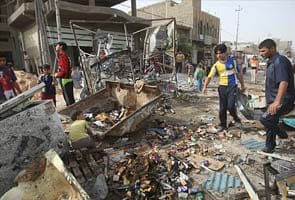
Baghdad:
More than a dozen bomb attacks in and around Baghdad on Sunday left 13 people dead, including seven policemen killed in a suicide attack, and 65 wounded.
The series of attacks come just days after blasts against police in a tense northern city killed 29 people, with just months to go before all US forces must withdraw from Iraq amid question marks over whether local security forces are up to the task of maintaining stability in the war-wracked country.
A total of 11 roadside bombs, two vehicles packed with explosives and one suicide attacker struck in the spate of morning blasts, although it was not immediately clear if the violence was coordinated.
The deadliest attack saw seven Iraqi policemen killed and 10 others wounded in a suicide bombing in the town of Taji, 25 kilometres (15 miles) north of the capital, an interior ministry official said, on condition of anonymity.
A car bomb had initially gone off at around 9:00 am (0600 GMT) in the town, and when residents and ambulance crews arrived at the scene, a suicide bomber blew himself up, the official said.
Four roadside bombs and a car bomb near a police station in the south Baghdad neighbourhood of Al-Amil killed two people and wounded 15, including three policemen, while a roadside bomb in Saidiyah, also in the south, wounded three people.
Two separate roadside bombs, one near a hospital and another near a popular market, in the predominantly Shiite north Baghdad district of Sadr City left two people dead and 14 wounded, the interior ministry official said.
Also in north Baghdad, a roadside bomb targeting a police brigadier general's convoy killed a civilian and wounded five people, including two of the senior commander's bodyguards.
Two roadside bombs in central Al-Wathiq square killed one person and wounded 12, six of them policemen, while a bomb blast in eastern Beirut Square wounded six.
Sunday's violence comes a day after seven people were killed in attacks in the disputed northern province of Kirkuk, further raising tension in the oil-producing region after three bombings killed 29 people in Iraq's deadliest day since late March.
Kirkuk lies at the centre of a tract of disputed territory that Kurdish leaders want to incorporate in their autonomous region in the north over the opposition of its Arab and Turkmen communities.
Currently, US forces participate in confidence-building tripartite patrols and checkpoints with central government forces and Kurdish security officers in Kirkuk and across northern Iraq.
But the withdrawal of some 45,000 US troops still in Iraq must be completed by the end of the year, according to the terms of a bilateral security pact.
Violence is down dramatically in Iraq from its peak in 2006-7, but attacks remain common. A total of 211 Iraqis were killed in violence in April, according to official figures.
The series of attacks come just days after blasts against police in a tense northern city killed 29 people, with just months to go before all US forces must withdraw from Iraq amid question marks over whether local security forces are up to the task of maintaining stability in the war-wracked country.
A total of 11 roadside bombs, two vehicles packed with explosives and one suicide attacker struck in the spate of morning blasts, although it was not immediately clear if the violence was coordinated.
The deadliest attack saw seven Iraqi policemen killed and 10 others wounded in a suicide bombing in the town of Taji, 25 kilometres (15 miles) north of the capital, an interior ministry official said, on condition of anonymity.
A car bomb had initially gone off at around 9:00 am (0600 GMT) in the town, and when residents and ambulance crews arrived at the scene, a suicide bomber blew himself up, the official said.
Four roadside bombs and a car bomb near a police station in the south Baghdad neighbourhood of Al-Amil killed two people and wounded 15, including three policemen, while a roadside bomb in Saidiyah, also in the south, wounded three people.
Two separate roadside bombs, one near a hospital and another near a popular market, in the predominantly Shiite north Baghdad district of Sadr City left two people dead and 14 wounded, the interior ministry official said.
Also in north Baghdad, a roadside bomb targeting a police brigadier general's convoy killed a civilian and wounded five people, including two of the senior commander's bodyguards.
Two roadside bombs in central Al-Wathiq square killed one person and wounded 12, six of them policemen, while a bomb blast in eastern Beirut Square wounded six.
Sunday's violence comes a day after seven people were killed in attacks in the disputed northern province of Kirkuk, further raising tension in the oil-producing region after three bombings killed 29 people in Iraq's deadliest day since late March.
Kirkuk lies at the centre of a tract of disputed territory that Kurdish leaders want to incorporate in their autonomous region in the north over the opposition of its Arab and Turkmen communities.
Currently, US forces participate in confidence-building tripartite patrols and checkpoints with central government forces and Kurdish security officers in Kirkuk and across northern Iraq.
But the withdrawal of some 45,000 US troops still in Iraq must be completed by the end of the year, according to the terms of a bilateral security pact.
Violence is down dramatically in Iraq from its peak in 2006-7, but attacks remain common. A total of 211 Iraqis were killed in violence in April, according to official figures.
Track Latest News Live on NDTV.com and get news updates from India and around the world

